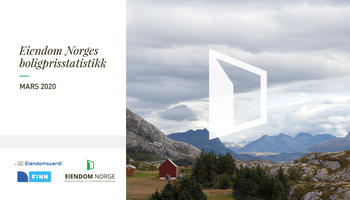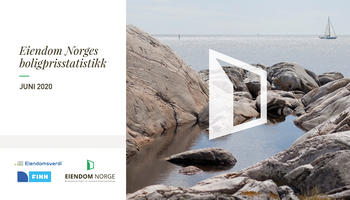
Decline in housing prices in September
Housing prices fell by 0.9 per cent in September. Adjusted for seasonal variations, prices rose by 0.2 per cent.
House prices are now 8 percent higher than a year ago.
- House prices in Norway developed stronger in September than normal for the month. Several cities such as Kristiansand, Stavanger, Trondheim and Bodø had a strong seasonally adjusted development, says CEO Henning Lauridsen of Eiendom Norge.
- At the end of September, we received the first of several announced interest rate increases from Norges Bank, but it is too early to see signs of higher interest rates in house price developments. Historically, there has also been a tendency for gradual interest rate increases to take longer to have an effect in the housing market, he says.
- Regardless of higher interest rates, price developments throughout the country are declining, and the housing market is now following a normal economic cycle, something the market did not do in 2020. We expect house prices to continue to fall as normal through the autumn. And as it stands now, house price development for 2021 will be somewhat weaker than Eiendom Norge's forecast of 7.5 per cent 12-month growth at the end of the year, says Lauridsen.
Record sales so far in 2021
In September, 10,378 homes were sold in Norway, which is 6.8 per cent less than in the corresponding month in 2020.
So far this year, 81,060 homes have been sold in Norway, which is 4.7 per cent more than in the same period in 2020.
In September, 9,987 homes were put up for sale in Norway, which is 7.1 per cent less than in the same month in 2020.
So far this year, 84,636 homes have been put up for sale in Norway, which is 3.8 per cent more than in the same period in 2020.
- Slightly fewer homes were sold in September this year than last year, but so far this year, so many second-hand homes have never been put out or sold, says Lauridsen.
It took an average of 35 days to sell a home in September 2021, the same as in August. Bodø w / Fauske had the shortest sales time with 14 days and Ålesund w / surroundings had the longest sales time with 62 days.
- On average, so far in 2021 it has been faster to sell a home in Norway than in recent years. Especially in Sørlandet and Rogaland, sales time has decreased a lot compared to previous years, says Lauridsen.
Bodø strongest last year
Bodø w / Fauske and Kristiansand had the strongest seasonally adjusted price development in September, with an increase of 1.1 and 1 per cent. Follo had the weakest seasonally adjusted price development with a seasonally adjusted decrease of 1 per cent.
Bodø / m Fauske had the strongest development in the last 12 months, with an increase of 14.7 per cent. Ålesund and the surrounding area had the weakest development in the last 12 months with an increase of 3.8 per cent.
- The 12-month growth fell in all areas in Norway in September as normal. Bodø w / Fauske stands out markedly with a very strong price increase over the past year, says Lauridsen.
New housing policy with new government
The Labor Party and the Center Party are now negotiating a new government platform and a new government.
- We have clear expectations that the parties follow up on their promises in housing policy in the party programs and in the previous period, Lauridsen says.
- We expect that the government will deliver policy on the following issues:
- A report to the Storting with a review of all instruments in housing policy.
- Strengthen the Minister for Housing and Building with the transfer of housing laws from the Ministry of Justice.
- New tax value system.
- Reduced document fee for first-time buyers.
- Relief on the requirements for first-time buyers in the Lending Regulations.
- The Norwegian self-ownership model has served us well and is very important both for the line of work and the distribution policy. Therefore, a government led by Jonas Gahr Støre (Labor Party) must be measured on whether they manage to further develop the Norwegian housing model and ensure that most Norwegians also own their own homes in the future, Lauridsen concludes.






